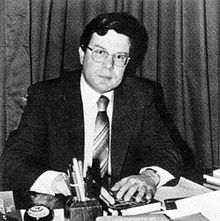José Guilherme Merquior
Brazilian academic, writer and diplomat (1941–1991)
José Guilherme Merquior (April 22, 1941 – January 7, 1991) was a Brazilian diplomat, academic, writer, literary critic and philosopher.

Quotes
editFoucault (1985)
editFoucault (1985), HarperCollins/Fontana Press
- [A] number of points are worth making at once [that challenge Foucault’s Madness and Civilization]: (1) There is ample evidence of medieval cruelty towards the insane; (2) In the late Middle Ages and the Renaissance, the mad were already confined, to cells, jails or even cages; (3) ‘dialogue’ or no ‘dialogue’, even madness during those times was frequently connected with sin -- even in the Ship of Fools mythology; and, to that extent, it was regarded in a far less benevolent light than suggested by Foucault (pre-modern minds accepted the reality of madness -- ‘madness as a part of truth’ -- just as they accepted the reality of sin; but this does not mean they valued madness, any more than sin; (4) as Martin Schrenk (himself a severe critic Foucault) has shown, early modern madhouses developed from medieval hospitals and monasteries rather than as reopened leprosaria; (5) the Great Confinement was primarily aimed not at deviance but at poverty -- criminal poverty, crazy poverty or just plain poverty; the notion that it heralded (in the name of the rising bourgeoise) a moral segregation does not bear close scrutiny; (6) at any rate, as stressed by Klaus Doerner, another of critic of Foucault (Madmen and the Bourgeoisie, 1969), that there was no uniform state-controlled confinement: the English and German patterns, for example, strayed greatly from the Louis Quatorzian Grand Renfermement; (7) Foucault’s periodization seems to me amiss. By the late eighteenths century, confinement of the poor was generally deemed a failure; but it is then that confinement of the mad really went ahead, as so conclusively shown in statistics concerning England, France, and the United States; (8) Tuke and Pinel did not ‘invent’ mental illness. Rather, they owe much to prior therapies and often relied also on their methods; (9) moreover, in nineetenth-century England moral treatment was not that central in the medicalization of madness. Far from it: as shown by Andrew Scull, physicians saw Tukean moral therapy as a lay threat to their art, and strove to avoid it or adapt it to their own practice. Once more, Foucault’s epochal monoliths crumble before the contradictory wealth of the historical evidence.
- pp. 28-29
- So at bottom Foucault's enterprise seems stuck on the horns of a huge epistemological dilemma: if it tells the truth, then all knowledge is suspect in its pretense of objectivity; but in that case, how can the theory itself vouch for its truth? It's like the famous paradox about the Cretean Liar--and Foucault seemed quite unable to get out of it (which explains why he didn't even try to face it).
- p. 147